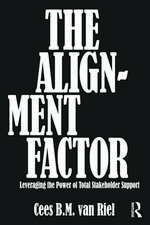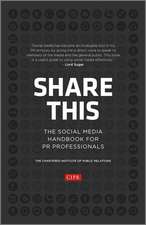Nation Branding, Public Relations and Soft Power: Corporatising Poland: Routledge New Directions in PR & Communication Research
Autor Pawel Surowiecen Limba Engleză Hardback – 4 aug 2016
Nation Branding, Public Relations and Soft Power: Corporatizing Poland provides an empirically grounded analysis of changes in the way in which various actors seek to manage Poland s national image in world opinion. It explores how and why changes in political economy have shaped these actors and their use of soft power in a way that is influenced by public relations, corporate communication, and marketing practices.
By examining the discourse and practices of professional nation branders who have re-shaped the relationship between collective identities and national image management, it plots changes in the way in which Poland s national image is communicated, and culturally reshaped, creating tensions between national identity and democracy. The book demonstrates that nation branding is a consequence of the corporatization of political governance, soft power and national identity, while revealing how the Poland "brand" is shaping public and foreign affairs.
Challenging and original, this book will be of interest to scholars in public relations, corporate communications, political marketing and international relations."
| Toate formatele și edițiile | Preț | Express |
|---|---|---|
| Paperback (1) | 276.70 lei 6-8 săpt. | |
| Taylor & Francis – 29 iul 2019 | 276.70 lei 6-8 săpt. | |
| Hardback (1) | 847.75 lei 6-8 săpt. | |
| Taylor & Francis – 4 aug 2016 | 847.75 lei 6-8 săpt. |
Din seria Routledge New Directions in PR & Communication Research
-
 Preț: 324.43 lei
Preț: 324.43 lei -
 Preț: 325.01 lei
Preț: 325.01 lei -
 Preț: 384.15 lei
Preț: 384.15 lei - 26%
 Preț: 764.20 lei
Preț: 764.20 lei - 18%
 Preț: 1007.48 lei
Preț: 1007.48 lei - 18%
 Preț: 1057.13 lei
Preț: 1057.13 lei -
 Preț: 436.14 lei
Preț: 436.14 lei -
 Preț: 426.73 lei
Preț: 426.73 lei -
 Preț: 384.86 lei
Preț: 384.86 lei -
 Preț: 389.38 lei
Preț: 389.38 lei - 26%
 Preț: 846.09 lei
Preț: 846.09 lei - 18%
 Preț: 276.70 lei
Preț: 276.70 lei -
 Preț: 332.84 lei
Preț: 332.84 lei -
 Preț: 389.38 lei
Preț: 389.38 lei -
 Preț: 383.12 lei
Preț: 383.12 lei -
 Preț: 389.66 lei
Preț: 389.66 lei -
 Preț: 381.00 lei
Preț: 381.00 lei - 18%
 Preț: 1000.27 lei
Preț: 1000.27 lei - 18%
 Preț: 1000.27 lei
Preț: 1000.27 lei - 17%
 Preț: 255.66 lei
Preț: 255.66 lei - 31%
 Preț: 762.57 lei
Preț: 762.57 lei -
 Preț: 781.82 lei
Preț: 781.82 lei - 31%
 Preț: 763.62 lei
Preț: 763.62 lei - 18%
 Preț: 1000.27 lei
Preț: 1000.27 lei -
 Preț: 480.72 lei
Preț: 480.72 lei - 25%
 Preț: 768.30 lei
Preț: 768.30 lei - 30%
 Preț: 847.34 lei
Preț: 847.34 lei - 18%
 Preț: 1056.28 lei
Preț: 1056.28 lei -
 Preț: 469.34 lei
Preț: 469.34 lei - 26%
 Preț: 763.47 lei
Preț: 763.47 lei - 18%
 Preț: 1001.07 lei
Preț: 1001.07 lei -
 Preț: 389.38 lei
Preț: 389.38 lei -
 Preț: 388.72 lei
Preț: 388.72 lei - 18%
 Preț: 1001.39 lei
Preț: 1001.39 lei
Preț: 847.75 lei
Preț vechi: 1178.16 lei
-28% Nou
162.24€ • 168.75$ • 133.94£
Carte tipărită la comandă
Livrare economică 15-29 aprilie
Specificații
ISBN-10: 1138818836
Pagini: 228
Ilustrații: 8
Dimensiuni: 156 x 234 x 18 mm
Greutate: 0.45 kg
Ediția:1
Editura: Taylor & Francis
Colecția Routledge
Seria Routledge New Directions in PR & Communication Research
Locul publicării:Oxford, United Kingdom
Public țintă
PostgraduateCuprins
Notă biografică
Recenzii
'This is an original and topical book about a country searching for a dignified place on the modern map of Europe. Readers learn not only about Poland, but also about blending nationalism with neo-liberalism and about adjusting the old-fashioned diplomacy to the digital age.' - Jan Zielonka, Professor of European Politics, St Antony’s College, University of Oxford, UK
'I like this book for two reasons. It is stimulating to see Bourdieu’s work applied to the investigation of promotional practices. As a Pole, I am delighted to see this careful analysis of institutional discourses of Polishness and the experiences that flow through them.' - Dr Magda Pieczka, Reader in Public Relations, Queen Margaret University, UK
Descriere
Nation Branding, Public Relations and Soft Power: Corporatizing Poland provides an empirically grounded analysis of changes in the way in which various actors seek to manage Poland s national image in world opinion. It explores how and why changes in political economy have shaped these actors and their use of soft power in a way that is influenced by public relations, corporate communication, and marketing practices.
By examining the discourse and practices of professional nation branders who have re-shaped the relationship between collective identities and national image management, it plots changes in the way in which Poland s national image is communicated, and culturally reshaped, creating tensions between national identity and democracy. The book demonstrates that nation branding is a consequence of the corporatization of political governance, soft power and national identity, while revealing how the Poland "brand" is shaping public and foreign affairs.
Challenging and original, this book will be of interest to scholars in public relations, corporate communications, political marketing and international relations."












